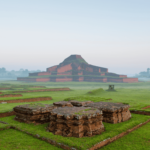Bangladesh is a democratic country with a multi-party governing system. As a result, many political parties have emerged over time. As of the latest update on August 30, 2024, fifty political parties are active in Bangladesh. The country became independent in 1971. From 1971 to 2024, a few parties governed the country, either individually or with their partners.
Some of the dominant and renowned parties are the Awami League, Bangladesh Nationalist Party, and Jatiya Party. There are also many minor parties that are noteworthy, though they have never formed a government, such as Jamaat-e-Islami, National People’s Party, Jatiya Samajtantrik Dal, Socialist Party of Bangladesh, Bangladesh Tarikat Federation, Bangladesh Muslim League, Islamic Front Bangladesh, Grassroots Bangladesh Nationalist Party, Bangladesh Nationalist Movement, and Amar Bangladesh Party.
Awami League
The Awami League is the oldest and longest-ruling party in Bangladesh as of 2024. It was established in 1949 by Bengali nationalists Abdul Hamid Khan Bhashani and Shamsul Huq, who were elected as the first president and general secretary of the party, respectively. In 1966, Bangabandhu Sheikh Mujibur Rahman gradually became the president of the Awami League. Under the leadership of the Awami League, the six-point movement, the 1969 uprising, and the election of 1970 took place. The Awami League played a significant role in the Liberation War of Bangladesh. After independence, in 1973, the first election was held in independent Bangladesh, and Bangabandhu Sheikh Mujibur Rahman became the Prime Minister of the People’s Republic of Bangladesh. After the assassination of Bangabandhu Sheikh Mujibur Rahman in 1975, the Awami League lost its ruling power, and many prominent figures of the party were jailed. In 1996, the Awami League won the 7th national election under the leadership of Sheikh Hasina, daughter of Bangabandhu Sheikh Mujibur Rahman, and ruled the country from 1996 to 2001. Again, in 2009, 2014, 2018, and 2024, the Awami League won the 9th, 10th, 11th, and 12th national elections, respectively, and ruled the country. Following the student protest in 2024, the party lost governing power for the last time, and the party’s president, Sheikh Hasina, was ousted.
Bangladesh Nationalist Party (BNP)
The Bangladesh Nationalist Party (BNP) was founded by Ziaur Rahman and established on September 1, 1978. Their election symbol is the Sheaf of Paddy. They first ran in a presidential election in 1979 and served the country from 1979 to 1981. After the assassination of Ziaur Rahman, his widow, Khaleda Zia, became the president of the party until 2018 before her imprisonment. In the 5th national election in 1991 and the 8th national election in 2001, they won and formed a government, serving the country during those periods. In other elections, they held many MP seats as a major opposition party. The current chairman of the party is Tarique Rahman, the son of the late Ziaur Rahman.
Jatiya Party
The Jatiya Party (JaPa or JP[E]) is a political party in Bangladesh. It was founded by former Army officer Hussain Mohammad Ershad and established on January 1, 1986. Their election symbol is the Plough, locally called “Langol.” In the 4th National election in 1988, they ran and formed a government, serving the country during that period. Ershad’s political career was known for its dictatorship, which led to his imprisonment for ten years. Later, the party ran in many elections and maintained its position as an opposition party in Parliament. The current chairperson of the party is GM Quader.







